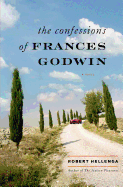Amazon Fire Phone's 'Built-in Showrooming Tool'
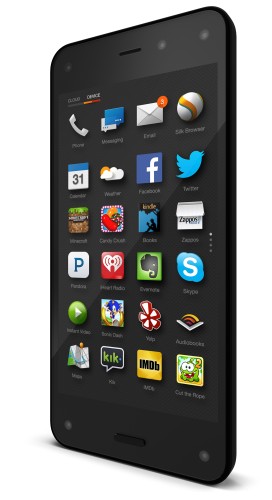 Yesterday, Amazon unveiled its Fire Phone, placing special emphasis on the smartphone's "Firefly" technology, which "recognizes things in the real world--Web and e-mail addresses, phone numbers, QR and bar codes, movies, music, and millions of products, and lets you take action in seconds--all with the simple press of the Firefly button." Pre-orders are being taken for the Fire Phone, which ships July 25 and is available exclusively on AT&T's network. With a two-year contract, the 32GB version retails for $199.99 (or $649 unlocked) and the 64GB for $299.99 ($749 unlocked).
Yesterday, Amazon unveiled its Fire Phone, placing special emphasis on the smartphone's "Firefly" technology, which "recognizes things in the real world--Web and e-mail addresses, phone numbers, QR and bar codes, movies, music, and millions of products, and lets you take action in seconds--all with the simple press of the Firefly button." Pre-orders are being taken for the Fire Phone, which ships July 25 and is available exclusively on AT&T's network. With a two-year contract, the 32GB version retails for $199.99 (or $649 unlocked) and the 64GB for $299.99 ($749 unlocked).
Business Insider called the Fire Phone a "showrooming nightmare," noting that it "makes Amazon an even bigger threat to brick-and-mortar retailers thanks to a feature called Firefly," which allows customers to "scan items in-person and encourages you to buy them on Amazon instead. In other words, Fire has a built-in showrooming tool."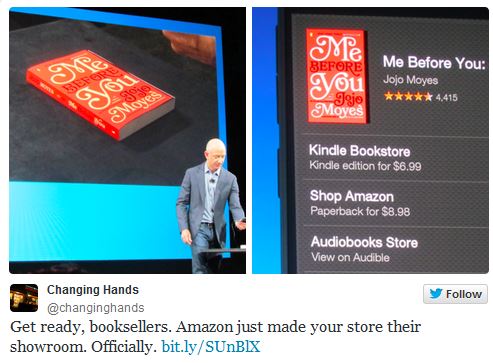
On Twitter, Skylight Books, Los Angeles, Calif, commented: "Amazon's phone allows our store to now be their storefront. :( "point the phone at anything and buy it on the spot."
"Amazon launches a shopping machine and calls it a phone" was the headline of a Quartz piece that noted "Bezos has already made one thing clear: This is a shopping device."
Rebecca Lieb, an analyst with the Altimeter Group, told the New York Times that Firefly "is potentially a real threat to bricks and mortar retailers. Scan a product or listen to music, and you're delivered straight to the page on Amazon on which you can purchase it. Impulse shopping just went to a new level."
There are, however, doubters. "Not everyone thinks ecommerce is enough of a differentiator to make the Fire Phone a success, or that Amazon is doing its shareholders a favor by diving deeper into the hyper-competitive world of consumer hardware," the Verge wrote. Forrester analyst Sucharita Mulpuru commented: "It's cart before the horse to think it will change retail. The phone needs to gain adoption first. I don't think the phone is exciting enough to attract early adopters and not priced low enough to get the late adopters either."
And from Forbes: "Maybe Amazon can fight Apple, Google, Netflix, Microsoft, Rackspace, Instacart, eBay, Pandora and Samsung all at once, while simultaneously battling publishers like Hachette over e-book pricing. But Bezos can't be great at doing all of this simultaneously. And make no mistake, he's involved in everything important at Amazon."
"Will you get one?" Engadget asked its tech-oriented readers. At press time, the poll responses were: "Absolutely" (15%), "No way" (53%), and "Maybe. Let me think. (32%).



SHELFAWARENESS.1222.S1.BESTADSWEBINAR.gif)


SHELFAWARENESS.1222.T1.BESTADSWEBINAR.gif)
 Christie Michaud, owner of
Christie Michaud, owner of 
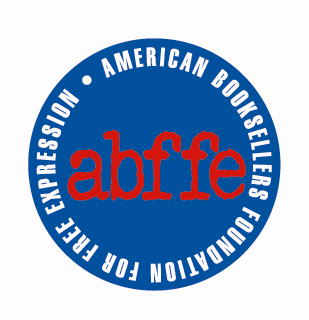 The two auctions of children's book art held in conjunction with this year's BookExpo America were deemed "a great success" by the
The two auctions of children's book art held in conjunction with this year's BookExpo America were deemed "a great success" by the  Kobo has
Kobo has 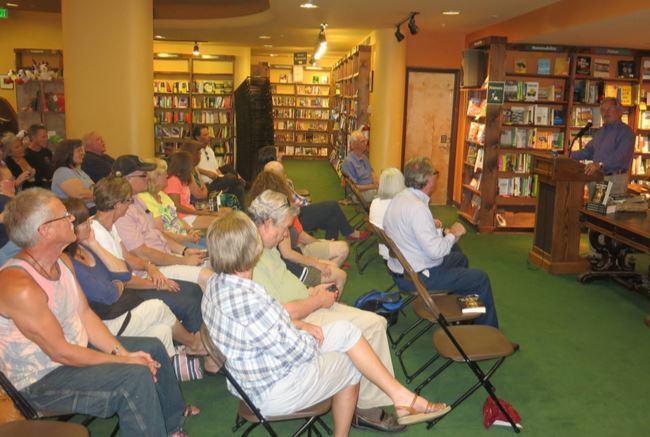 During a launch event at Denver's Tattered Cover Bookstore last Saturday, Mike Keefe, retired political cartoonist and Pulitzer Prize winner, presented The Enlisted Men's Club, the first of a series of novels based on the late Gary Reilly's experiences as a military policeman during the Vietnam War. When prolific author Reilly died in 2011, his manuscripts, including the Asphalt Warrior series, were left to friends Keefe and former journalist Mark Stevens, who co-founded Running Meter Press (now an imprint of Big Earth Publishing). Reilly's novel Doctor Lovebeads was a genre fiction finalist for this year's Colorado Book Awards. A video of the reading is
During a launch event at Denver's Tattered Cover Bookstore last Saturday, Mike Keefe, retired political cartoonist and Pulitzer Prize winner, presented The Enlisted Men's Club, the first of a series of novels based on the late Gary Reilly's experiences as a military policeman during the Vietnam War. When prolific author Reilly died in 2011, his manuscripts, including the Asphalt Warrior series, were left to friends Keefe and former journalist Mark Stevens, who co-founded Running Meter Press (now an imprint of Big Earth Publishing). Reilly's novel Doctor Lovebeads was a genre fiction finalist for this year's Colorado Book Awards. A video of the reading is  On its Musing blog,
On its Musing blog, 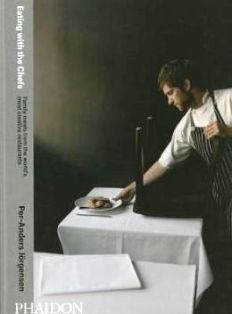 "In some of the finest restaurants across the world, kitchen and front of house staff gather to share food and conversation before the doors open to the general public," Ann Arbor News noted in its feature on a
"In some of the finest restaurants across the world, kitchen and front of house staff gather to share food and conversation before the doors open to the general public," Ann Arbor News noted in its feature on a 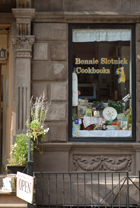 Sunday's "
Sunday's " Animal Madness: How Anxious Dogs, Compulsive Parrots, and Elephants in Recovery Help Us Understand Ourselves
Animal Madness: How Anxious Dogs, Compulsive Parrots, and Elephants in Recovery Help Us Understand Ourselves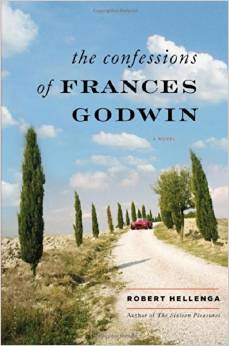 The Confessions of Frances Godwin is told in the end-of-life recollections of widow and retired high-school Latin teacher Frances Godwin. She narrates her story in a no-nonsense, practical Midwest voice, yet faced with death and loss, she mostly wants to understand the spiritual value of her life. Despite growing up in a strong Polish Catholic farm family in Galesburg, Ill., under a matriarch who believed that homemade pierogi and a full church confession to "clean out your attic" were central to living a good life, Frances strayed from the church and fell in love with her Shakespeare professor, Paul. While attending a postgraduate Latin seminar in Rome, she met up with him and soon became pregnant with their daughter, Stella--all before Paul divorced his wife and finally married Frances. Paul's good humor and easy camaraderie with her uncles win over her suspicious mother, but Frances never quite shakes the nagging guilt over her adultery and out-of-wedlock pregnancy. When a grown Stella takes up with Jimmy, a thuggish ex-con Italian Catholic from a Milwaukee produce-distribution family, and Paul develops rapidly advancing lung cancer, Frances finds herself racking up more sins, guilt and remorse to protect her family ("I had crossed a line.... No going back. Not that there's ever any going back.... Actually, there was a way to go back. I knew the drill: contrition, confession, satisfaction. But I was in no mood to turn around").
The Confessions of Frances Godwin is told in the end-of-life recollections of widow and retired high-school Latin teacher Frances Godwin. She narrates her story in a no-nonsense, practical Midwest voice, yet faced with death and loss, she mostly wants to understand the spiritual value of her life. Despite growing up in a strong Polish Catholic farm family in Galesburg, Ill., under a matriarch who believed that homemade pierogi and a full church confession to "clean out your attic" were central to living a good life, Frances strayed from the church and fell in love with her Shakespeare professor, Paul. While attending a postgraduate Latin seminar in Rome, she met up with him and soon became pregnant with their daughter, Stella--all before Paul divorced his wife and finally married Frances. Paul's good humor and easy camaraderie with her uncles win over her suspicious mother, but Frances never quite shakes the nagging guilt over her adultery and out-of-wedlock pregnancy. When a grown Stella takes up with Jimmy, a thuggish ex-con Italian Catholic from a Milwaukee produce-distribution family, and Paul develops rapidly advancing lung cancer, Frances finds herself racking up more sins, guilt and remorse to protect her family ("I had crossed a line.... No going back. Not that there's ever any going back.... Actually, there was a way to go back. I knew the drill: contrition, confession, satisfaction. But I was in no mood to turn around").